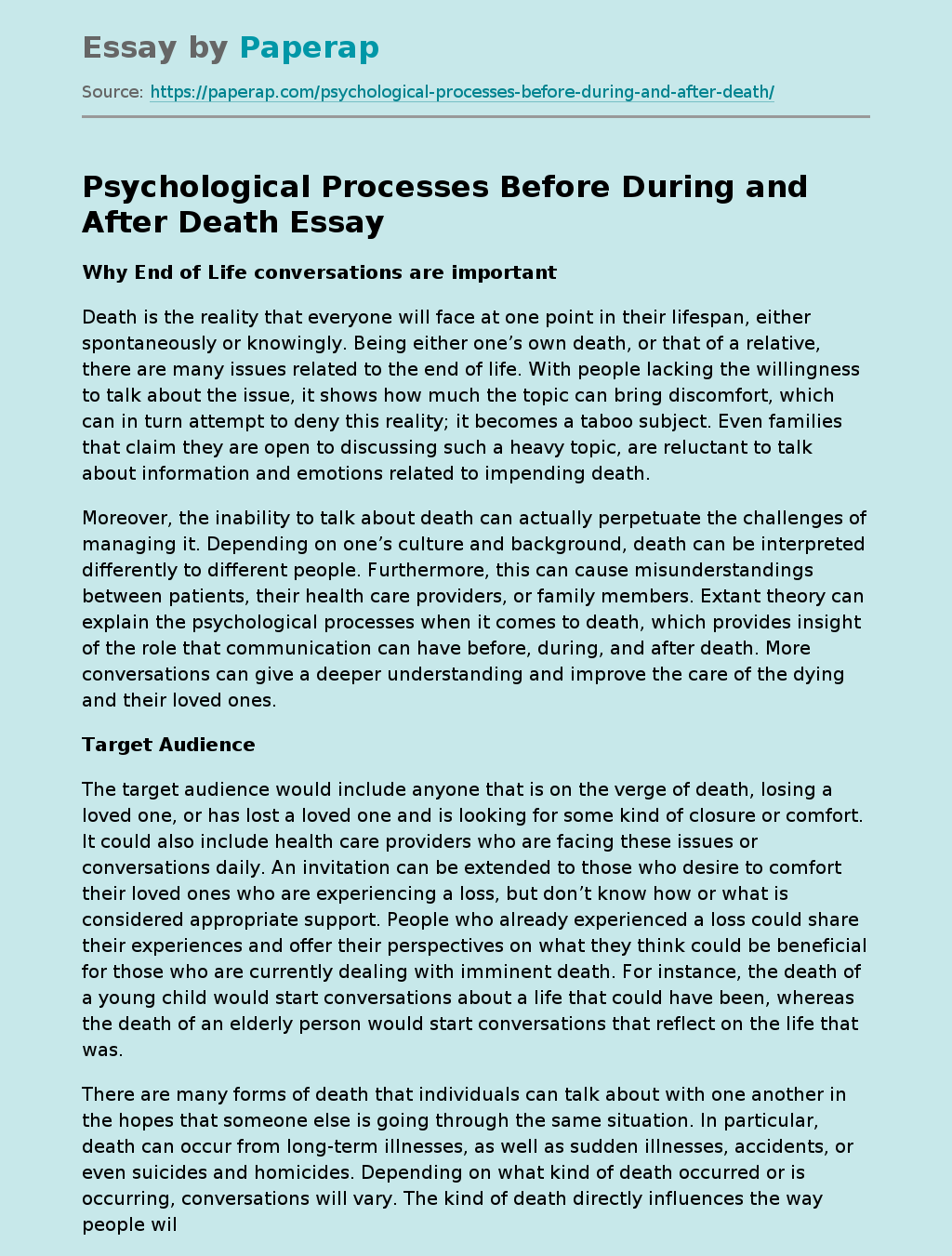Psychological Processes Before During and After Death
Why End of Life conversations are important
Death is the reality that everyone will face at one point in their lifespan, either spontaneously or knowingly. Being either one’s own death, or that of a relative, there are many issues related to the end of life. With people lacking the willingness to talk about the issue, it shows how much the topic can bring discomfort, which can in turn attempt to deny this reality; it becomes a taboo subject. Even families that claim they are open to discussing such a heavy topic, are reluctant to talk about information and emotions related to impending death.
Moreover, the inability to talk about death can actually perpetuate the challenges of managing it. Depending on one’s culture and background, death can be interpreted differently to different people. Furthermore, this can cause misunderstandings between patients, their health care providers, or family members. Extant theory can explain the psychological processes when it comes to death, which provides insight of the role that communication can have before, during, and after death.
More conversations can give a deeper understanding and improve the care of the dying and their loved ones.
Target Audience
The target audience would include anyone that is on the verge of death, losing a loved one, or has lost a loved one and is looking for some kind of closure or comfort. It could also include health care providers who are facing these issues or conversations daily. An invitation can be extended to those who desire to comfort their loved ones who are experiencing a loss, but don’t know how or what is considered appropriate support.
People who already experienced a loss could share their experiences and offer their perspectives on what they think could be beneficial for those who are currently dealing with imminent death. For instance, the death of a young child would start conversations about a life that could have been, whereas the death of an elderly person would start conversations that reflect on the life that was.
There are many forms of death that individuals can talk about with one another in the hopes that someone else is going through the same situation. In particular, death can occur from long-term illnesses, as well as sudden illnesses, accidents, or even suicides and homicides. Depending on what kind of death occurred or is occurring, conversations will vary. The kind of death directly influences the way people will communicate about it, but nonetheless communicating these feelings or emotions can create a space for deeper understanding.
Curriculum
According to Giles, Thai, and Prestin (2014), Extant Theory can provide great insight into the role of communication before, during, and after the dying process; it focuses on the psychological processes involved in death. Having a deeper understanding of the psychological and emotional stages when approaching death can allow improved care of the dying and their loved ones. Having loved ones understand the dying process can provide better pain management, social and spiritual support, coping with the loss or grief, and the opportunity to express their needs and concerns.
We would discuss and explain Kubler-Ross’s stages of grief so everyone can better understand what they’re going through and know that their feelings are valid. In this stage theory, five psychological phases are described as what individuals go through as they approach death: denial, anger, bargaining, depression, and acceptance (Giles et al., 2014). Denial comes from the individual’s refusal of the belief that they are dying. Denial transitions into anger, in which an individual understands death is near, but may also have unresolved conflicts that may cause them to be resentful. Moreover, bargaining involves creating situations in which death can be postponed.
Depression follows after, specifically in which one experiences a sense of loss with the thought of leaving the world. The last stage is acceptance, and we would talk about ways to handle all the preceding stages of emotions with the hope of an easy transition into acceptance. Some might reach acceptance more smoothly than others, so it’s important to encourage anyone who’s nearing death to express their emotions, whether it’s anger, denial, or grief. Even nonverbal communication can assist one during the acceptance stage.
Our goal is to legitimize the topic of death by having discussions and offering a structure for death that can reduce the anxiety of care providers and loved ones. The role and needs of communication during these processes differ at each stage. For example, someone during the “anger” stage may verbalize their emotion and direct it towards their loved ones or caregivers. We can help caregivers to encourage patients to express these negative emotions without directing it to family members or people who are only trying to help them.
Psychological Processes Before During and After Death. (2021, Dec 11). Retrieved from https://paperap.com/psychological-processes-before-during-and-after-death/

